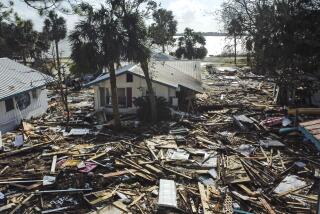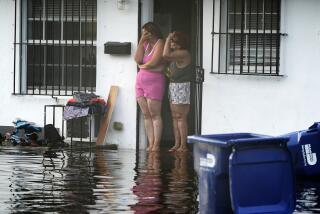Wilma Sprints Through Florida
- Share via
NAPLES, Fla. — Hurricane Wilma pounded its way across Florida on Monday, killing at least three people and causing widespread flooding, power outages and property damage.
The storm moved with fierce speed, making landfall on Florida’s west coast about 6:30 a.m. at Cape Romano, a deserted area south of Marco Island. Within six hours, Wilma had traversed the state, exiting near Palm Beach on the Atlantic coast.
The Panhandle was the only part of Florida spared the effects of the record-tying 21st storm of the 2005 hurricane season.
With sustained winds of 125 mph, Wilma was a Category 3 hurricane at landfall; the storm dropped to a Category 2 as it crossed the state, then intensified into a Category 3 as it headed northward into the Atlantic.
By midafternoon, rain had stopped falling along Florida’s east coast.
Preliminary estimates put damage from Wilma between $4 billion and $10 billion. More than 2 million homes were without power Monday, said R. David Paulison, acting director of the Federal Emergency Management Agency. About 36,000 people had sought refuge in 124 shelters across the state.
But the major concern was for those who had ignored days of warnings about Wilma and decided to ride out the storm. Paulison said disaster teams were especially worried about those who had stayed in their mobile homes.
Officials at the National Hurricane Center in Miami said Wilma’s furious pace as it crossed Florida was not surprising, given that the storm had ballooned from a tropical depression to the strongest hurricane on record in less than four days.
President Bush on Monday authorized a major disaster declaration for the state, making federal aid immediately available in most of Florida. Wilma was the eighth hurricane to hit the state in 13 months.
“We’re tired of hurricanes, I can tell you that,” Paulison said.
Emergency officials said that in the Florida Keys, about 90% of residents had refused to evacuate.
Seawater pushed by Wilma’s winds had swamped much of the Keys, local officials said Monday. The flooding appeared to be the worst in years.
“Currently in the Lower Keys, we’re experiencing severe flooding. We’re still having storm surge as we speak,” Greg Artman, a Monroe County emergency operations spokesman, said early Monday.
Power was out Monday to the entire island chain, Artman said. U.S. 1 -- the Overseas Highway and the only link with mainland Florida -- was impassable in two places.
A water main that supplies Key West had broken because of the storm, and Artman said Key West International Airport was underwater and had been severely damaged.
“We have reports from all over about people’s houses being flooded,” Artman said. “We have everything from people talking about 3 feet of water in their house to a couple of inches.”
State officials confirmed three hurricane-related deaths, and there were reports of three more fatalities.
Colleen Englert, a spokeswoman for the state emergency operations center in Tallahassee, said one man was killed in Collier County when his roof collapsed. Another Collier County man with a history of diabetes and heart disease collapsed and died -- possibly from hurricane-induced stress -- when he went outside to inspect damage, Englert said.
And in St. Johns County in northeastern Florida, far from Wilma’s path, a woman who was fleeing from the storm died when the vehicle she was in had a blowout and overturned, Englert said.
In Coral Springs near Fort Lauderdale, a man was killed by a falling tree, Broward County spokeswoman Heather Babb said. Two people were killed in separate incidents in Palm Beach County, Associated Press reported.
In Naples, just north of where Wilma crossed into the state, intense winds snapped palm trees in two. Collier County Commission Chairman Fred Coyle said that although Naples escaped a damaging storm surge, many streets were under 2 to 3 feet of water -- about twice what would accumulate after a heavy rain.
The Gulf Coast resort community of Marco Island, which was under a mandatory evacuation order, suffered limited structural damage. City Manager A. William Moss said about 90% of the island’s residents had left ahead of the storm.
In Clewiston, about 60 miles inland, streets were flooded and 200-year-old trees lay on their sides. Shop windows were blown out, and some mobile homes were flipped off their concrete foundations.
The storm’s winds, which strengthened as Wilma passed over Florida’s east coast, broke a construction crane in half in Hollywood, just south of Fort Lauderdale. Chunks of asphalt flew through the trees, smashing car windows.
Wilma also blew out the windows in several Miami skyscrapers. Lt. Bill Schwartz, a spokesman for the Miami-Dade Police Department, said the headquarters building shook violently as the hurricane passed.
Schwartz said one looting incident had been reported in Miami, when several men broke into a convenience store in search of beer. He said the city had no plans for a curfew.
NASA closed the Kennedy Space Center on the Atlantic coast east of Orlando. Around the state, 19 airports were closed at some point Monday in deference to Wilma.
West Palm Beach Mayor Lois J. Frankel said winds of 111 mph were recorded at the city’s airport.
“What we are dealing with is hurricane fatigue,” Frankel said. Many homes in West Palm Beach were damaged, she said, because their owners -- tired of putting shutters up and taking them down every time a storm came along -- failed to listen to repeated warnings in the days before Wilma roared through.
But others did listen -- and were prepared.
“The good news is we knew the storm was coming,” Lt. Gov. Toni Jennings said.
Emergency officials also said it was a blessing that Wilma had hit hardest in an uninhabited area: Everglades National Park. Chris Landsea, a forecaster at the National Hurricane Center, said the storm temporarily raised the ocean level in that area by 12 to 18 feet.
Danny Daniels, 50, an airboat captain who is the fifth generation of his family to live on the southwestern edge of the Everglades, took the storm warnings seriously and rode the hurricane out in a secure house inland.
Still, Daniels said, the experience was frightening.
“You could hear the gusts coming before you felt them and the trees popping like a series of firecrackers ... as they snapped,” Daniels said. “It was a scary feeling, like you’d get from skydiving -- except it lasted for hours.”
At midday Monday, Daniels was still without news of his parents, Wayne and Susan, who had elected to stay in their home on Chokoloskee Island.
As Danny Daniels sat in his airboat about five miles north of Everglades City, the winds were blowing 30 to 40 mph, making it dangerous to use such a watercraft, he said.
Besides, Daniels said, the channels through the mangroves that lead to the island where his parents live had been closed off by Wilma.
“I can’t get to them,” he said.
FEMA’s Paulison said Monday that federal response teams were prepared to take quick action to assist residents affected by Wilma; the agency was highly criticized after Hurricane Katrina.
“We’re all stressed out a little bit, but we’re prepared to handle this,” Paulison said.
In contrast to Katrina relief efforts, Paulison said: “We are in a very robust communications with the state. We are working in partnership with them. We can move our stuff in as quickly as the state asks.”
In Cuba, however, the situation was less sanguine. Much of Havana was submerged Monday as roadways turned into saltwater rivers. Coastal fishing towns were evacuated before the storm, but many residents remained in Havana, where Wilma became the worst storm to hit since 1993.
The storm also battered Mexico’s Yucatan Peninsula. President Vicente Fox on Monday ordered troops into Cancun, where some looting occurred. Officials said it could take months to restore Cancun’s flourishing tourism trade.
Joining Wilma in the Atlantic on Monday was Tropical Depression Alpha, which became the record-breaking 22nd named storm of 2005. Alpha, which drenched Haiti and the Dominican Republic on Sunday, was not considered a threat to the United States.
Meteorologists said Hurricane Wilma would continue to cause heavy winds and rain as it raced along the Eastern Seaboard toward Canada’s Maritime Provinces.
*
Dahlburg reported from Florida and Mehren from Boston.
More to Read
Sign up for Essential California
The most important California stories and recommendations in your inbox every morning.
You may occasionally receive promotional content from the Los Angeles Times.













